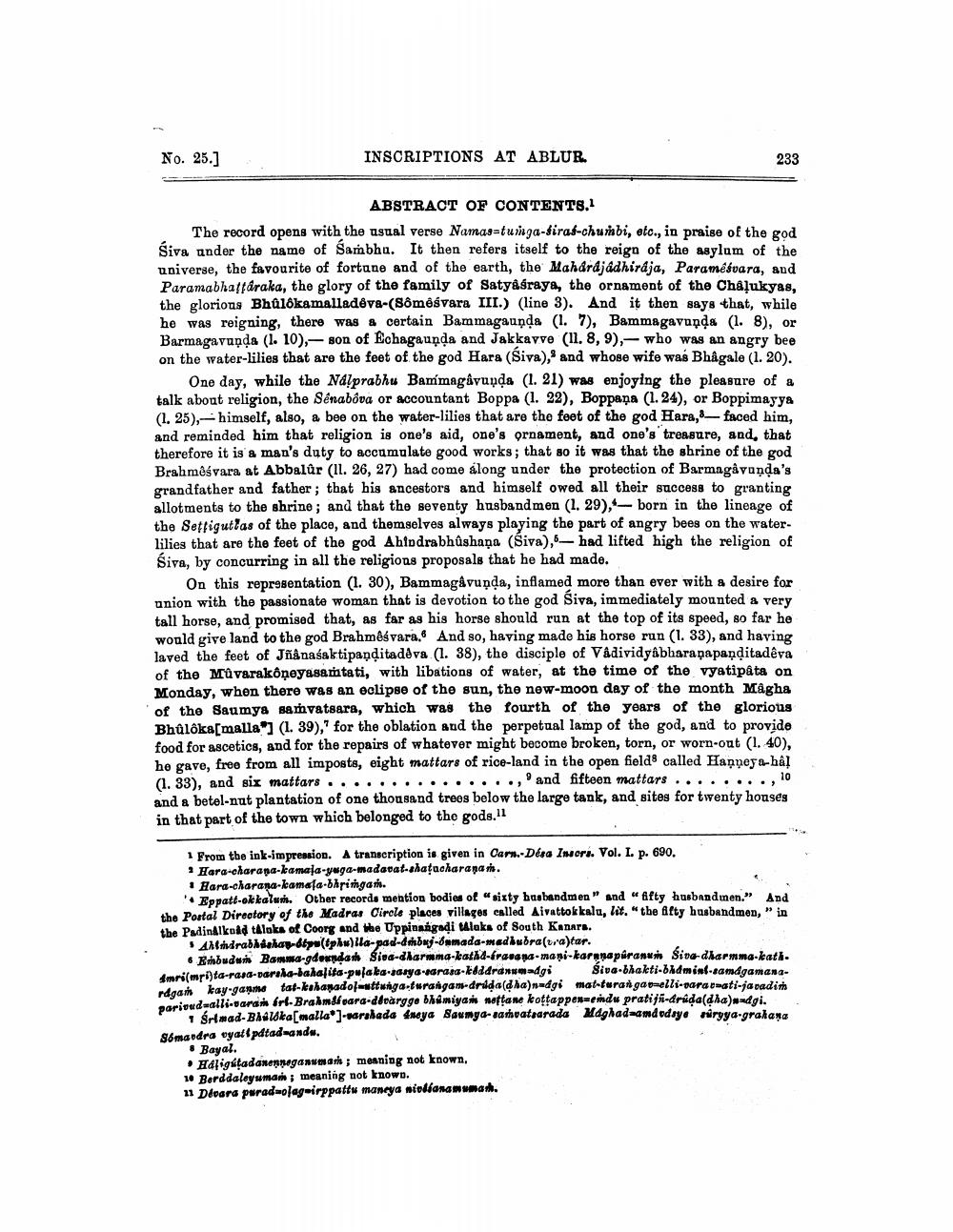________________
No. 25.]
INSCRIPTIONS AT ABLUR.
233
ABSTRACT OF CONTENTS. The record opens with the usual verse Namas-tuga-firaf-churabi, etc., in praise of the god Siva under the name of Sambha. It then refers itself to the reign of the asylum of the universe, the favourite of fortune and of the earth, the Mahardjadhirdja, Paramésvara, and Paramabhaftáraka, the glory of the family of Satyásraya, the ornament of the Châļukyas, the glorions Bhuldkamalladéva-(8ômêsvara III.) (line 3). And it then says that, while he was reigning, there was a certain Bammagauņda (1.7), Bammagavupda (1. 8), or Barmagavanda (1. 10),- son of Echagauņda and Jakkavve (11. 8, 9),- who was an angry bee on the water-lilies that are the feet of the god Hara (Siva), and whose wife was Bhagale (1. 20).
One day, while the Nalprabhu Bam'magayuụda (1. 21) was enjoying the pleasure of a talk about religion, the Sénabôva or accountant Boppa (1. 22), Boppana (1. 24), or Boppimayya (1.25), himself, also, a bee on the water-lilies that are the feet of the god Hara, & faced him, and reminded him that religion is one's aid, one's ornament, and one's treasure, and, that therefore it is a man's duty to accumulate good works; that so it was that the shrine of the god Brahmêśvara at Abbalûr (1l. 26, 27) had come along under the protection of Barmagåvanda's grandfather and father; that his ancestors and himself owed all their success to granting allotments to the shrine; and that the seventy husbandmen (1. 29), born in the lineage of the Seffigutlas of the place, and themselves always playing the part of angry bees on the waterlilies that are the feet of the god Abiodrabhûshaņa (Siva), - had lifted high the religion of Siva, by concurring in all the religious proposals that he had made.
On this representation (1. 30), Bammagávunda, inflamed more than ever with a desire for union with the passionate woman that is devotion to the god Siva, immediately mounted a very tall horse, and promised that, as far as his horse should run at the top of its speed, so far he would give land to the god Brahmêsvara. And so, having made his horse run (1. 33), and having laved the feet of Jñånasaktipaņditaddva (1. 38), the disciple of Vadividyabharapapaņditadêva of the Mûvarakonoyasamtati, with libations of water, at the time of the vyatipâta on Monday, when there was an eclipse of the sun, the now-moon day of the month Magha of the Saumya samvatsara, which was the fourth of the years of the glorious Bhûlôka[malla") (1. 39)," for the oblation and the perpetual lamp of the god, and to provide food for ascetics, and for the repairs of whatever might become broken, torn, or worn-out (1. 40), he gave, free from all imposts, eight mattars of rice-land in the open field called Hanneya-ha! (1. 33), and six mattars..............., and fifteen mattars ........, 10 and a betel-nut plantation of one thousand trees below the large tank, and sites for twenty houses in that part of the town which belonged to the gods.11
From the ink-impression. A transcription is given in Carn.-Désa Inori. Vol. I. p. 690. Hara-charapa-kamala-yuga-madarat-shatacharapan. 1 Hara-charana-kamafa-bhringan.
Eppati-okkalu. Other records mention bodies of "sixty husbandmen" and "Afty husbandınen." And the Portal Directory of the Madra. Cirole places villages called Aivattokkalu, lit. "the Afty husbandman.” in the PadinAlkold tiloks of Coorg and the Uppinangadi talaks of South Kanara.
Mudrabhishan-styu(tpho) lla-pad-drabuy-amada-nadbubra(oraytar.
Brabudush Bamma-gdeundash Siva-dharmma-kathd-Erasana mapi karenapüranus Siva-dharmma-kath. drilml)ta-rasa-parsla-bahafita pwlaka zasya-rasa-klddraadgi Siva.bhakti-Oldmint-samdgamanandoanh kay gay talksharadofuttunga furangan-drilda(dha)n-dgi mal-turaiga welli-nara unati-ja vadith rivud-alli-vara fri. Brahmsfoara-dfarggo bhi niyasi nottane kottappen-endu praliff-drida(dha)wedgi.
1 Srimad Bhadka[malla"]-aaralada Aneya Saumga-aanvatsarada Moghadaamd odaya ringga-grakana Semaodra eyati pdtad-andu.
. Bayal. • Haligutadanenseganean; meaning not known. 10 Berddaleysman; meaning not knowo. 11 Dioara purad-olag-irppattu maneya miodiang umah.




